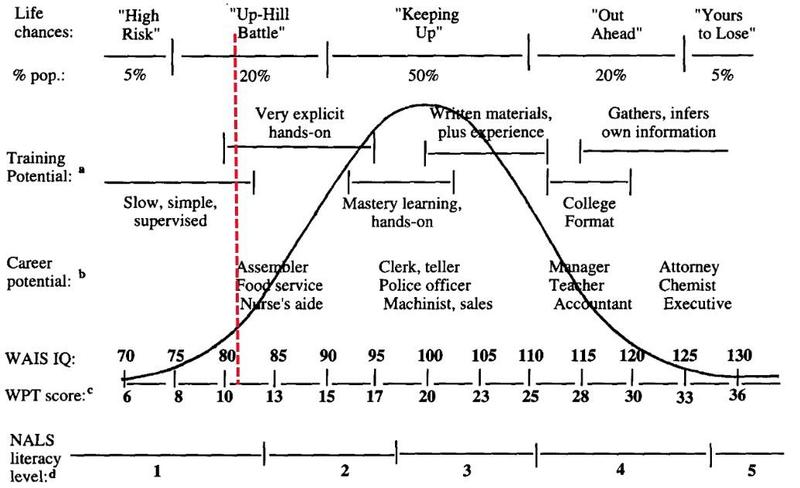Source: Texas A&M website, Apr 1997

You can and will work at a desk for seven hours straight, routinely.
the discipline of intensive and constant work.
You learn what you don’t know you are learning.
Students join forces on the problem sets, and some students benefit more than others from these weekly collective efforts. The most brilliant students will invariably work out all the problems and let other students copy, and I pretend to be annoyed when I learn that this has happened.
But I know that by making the effort to understand the solution of a truly difficult problem discovered by one of their peers, students learn more than they would by working out some less demanding exercise.
By and large, “knowing how” matters more than “knowing what.”
at MIT, “knowing how” is held in higher esteem than “knowing what” by faculty and students alike. Why?
It is my theory that “knowing how” is revered because it can be tested. One can test whether a student can apply quantum mechanics, communicate in French, or clone a gene. It is much more difficult to asses an interpretation of a poem, the negotiation of a complex technical compromise, or grasp of the social dynamics of a small, diverse working group. Where you can test, you can set a high standard of proficiency on which everyone is agreed; where you cannot test precisely, proficiency becomes something of a judgment call.
In science and engineering, you can fool very little of the time.
An education in engineering and science is an education in intellectual honesty. Students cannot avoid learning to acknowledge whether or not they have really learned. Once they have taken their first quiz, all MIT undergraduates know dearly they will pay if they fool themselves into believing they know more than is the case.
On campus, they have been accustomed to people being blunt to a fault about their own limitations-or skills-and those of others. Unfortunately, this intellectual honesty is sometimes interpreted as naivete.
You don’t have to be a genius to do creative work.
The drive for excellence and achievement that one finds everywhere at MIT has the democratic effect of placing teachers and students on the same level, where competence is appreciated irrespective of its provenance.
Students learn that some of the best ideas arise in groups of scientists and engineers working together, and the source of these ideas can seldom be pinned on specific individuals. The MIT model of scientific work is closer to the communion of artists that was found in the large shops of the Renaissance than to the image of the lonely Romantic genius.
You must measure up to a very high level of performance.
What matters most is the ambiance in which the course is taught; a gifted student will thrive in the company of other gifted students. An MIT undergraduate will be challenged by the level of proficiency that is expected of everyone at MIT, students and faculty.
The expectation of high standards is unconsciously absorbed and adopted by the students, and they carry it with them for life.
The world and your career are unpredictable, so you are better off learning subjects of permanent value.
You are never going to catch up, and neither is anyone else.
MIT students often complain of being overworked, and they are right. When I look at the schedules of courses my advisees propose at the beginning of each term, I wonder how they can contemplate that much work. My workload was nothing like that when I was an undergraduate.
There is some satisfaction, however, for a faculty member in encountering a recent graduate who marvels at the light work load they carry in medical school or law school relative to the grueling schedule they had to maintain during their four years at MIT.
The future belongs to the computer-literate-squared.
The undergraduate curriculum in computer science at MIT is probably the most progressive and advanced such curriculum anywhere. Rather, the students learn that side by side with required courses there is another, hidden curriculum consisting of new ideas just coming into use, new techniques and that spread like wildfire, opening up unsuspected applications that will eventually be adopted into the official curriculum.
Keeping up with this hidden curriculum is what will enable a computer scientist to stay ahead in the field. Those who do not become computer scientists to the second degree risk turning into programmers who will only implement the ideas of others.
Mathematics is still the queen of the sciences.
Having tried in lessons one through nine to take an unbiased look at the big MIT picture, I’d like to conclude with a plug for my own field, mathematics.
When an undergraduate asks me whether he or she should major in mathematics rather than in another field that I will simply call X, my answer is the following: “If you major in mathematics, you can switch to X anytime you want to, but not the other way around.”
Alumni who return to visit invariably complain of not having taken enough math courses while they were undergraduates. It is a fact, confirmed by the history of science since Galileo and Newton, that the more theoretical and removed from immediate applications a scientific topic appears to be, the more likely it is to eventually find the most striking practical applications.
Consider number theory, which only 20 years ago was believed to be the most useless chapter of mathematics and is today the core of computer security. The efficient factorization of integers into prime numbers, a topic of seemingly breathtaking obscurity, is now cultivated with equal passion by software desigers and code breakers.
I am often asked why there are so few applied mathematicians in the department at MIT. The reason is that all of MIT is one huge applied mathematics department; you can find applied mathematicians in practicially every department at MIT except mathematics.









